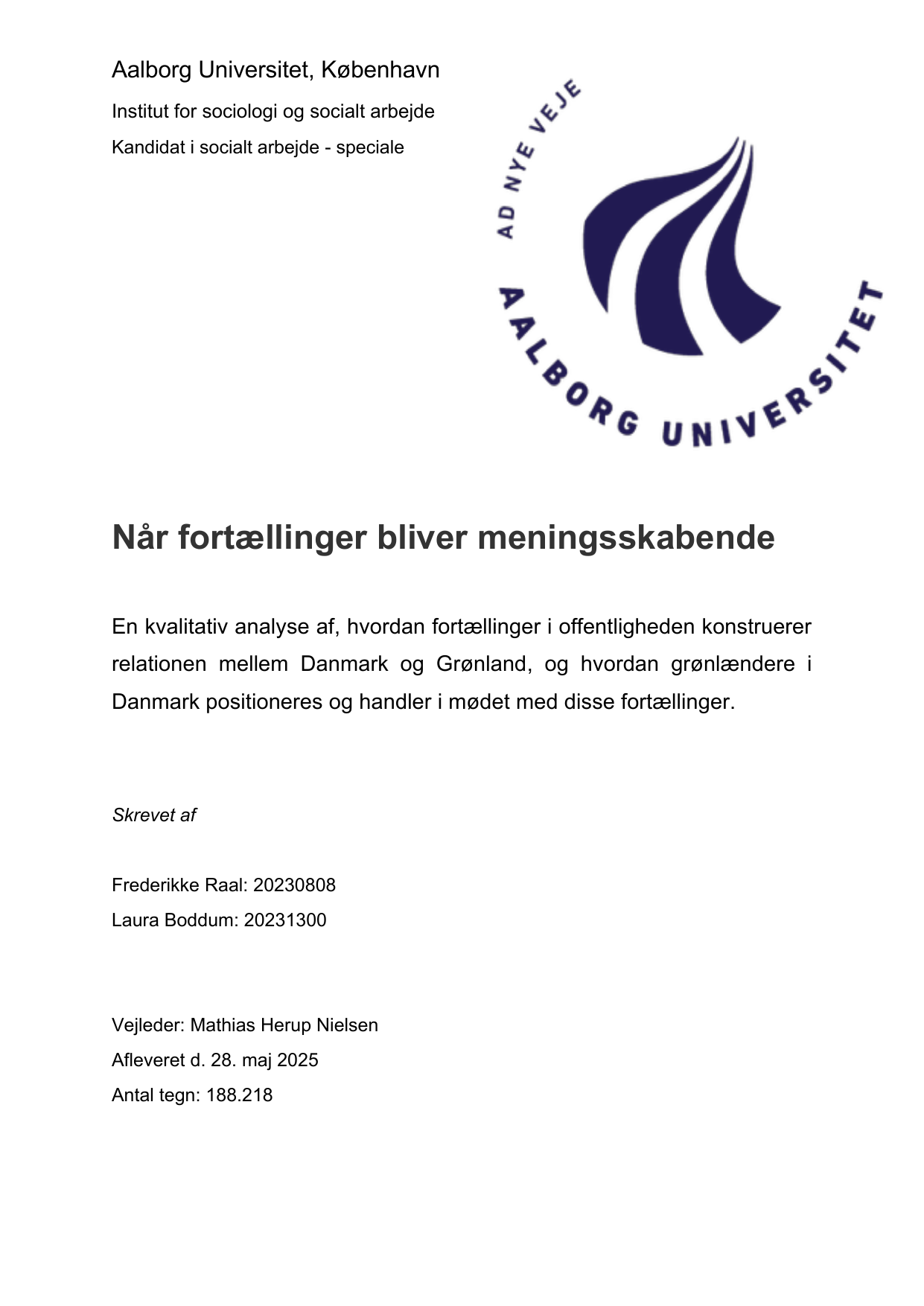
Når fortællinger bliver meningsskabende: En kvalitativ analyse af, hvordan fortællinger i offentligheden konstruerer relationen mellem Danmark og Grønland, og hvordan grønlændere i Danmark positioneres og handler i mødet med disse fortællinger.: En kvalitativ analyse af, hvordan fortællinger i offentligheden konstruerer relationen mellem Danmark og Grønland, og hvordan grønlændere i Danmark positioneres og handler i mødet med disse fortællinger.
Oversat titel
When Narratives Produce Meaning: A Qualitative Analysis of How Public Narratives Construct the Relationship Between Denmark and Greenland, and How Greenlanders in Denmark Are Positioned and Respond to These Narratives: A Qualitative Analysis of How Public Narratives Construct the Relationship Between Denmark and Greenland, and How Greenlanders in Denmark Are Positioned and Respond to These Narratives
Forfattere
Semester
4. semester
Uddannelse
Udgivelsesår
2025
Afleveret
2025-05-28
Antal sider
80
Abstract
Abstract This master’s thesis investigates how the relationship between Denmark and Greenland is narrated in the Danish public sphere, and how Greenlandic individuals living in Denmark respond to and act upon these narratives. Through a social constructivist framework, the study examines how dominant narrative, often shaped by postcolonial power dynamics, positions Greenlanders in stereotypical and stigmatized ways, despite formal legal equality. Motivated by a curiosity about how historical and contemporary representations shape identity, belonging, and social interaction, the thesis applies a theoretical framework combining Donileen R. Loseke’s narrative theory, Michel Foucault’s concepts of discourse, power, and subjectivation, and Erving Goffman’s theory of stigma. Through this lens, the analysis explores how political, media, and public discourses construct meaning and shape the everyday realities of Greenlanders in Denmark. Empirically, the study revolves around four focal points: (1) the narrative presented in the documentary Grønlands Hvide Guld; (2) portrayals of Denmark as a “hero” and Greenland as a “victim” in parliamentary debates from 2008, 2018, and 2024; (3) the controversy surrounding the documentary and its reception; and (4) the implications of these narratives for the social positioning, identity work, and emotional responses of Greenlandic individuals in Denmark. The thesis’ empirical material includes qualitative interviews with seven Greenlanders living in Denmark, a contextual interview with staff from The Greenlandic House, and selected political and media documents. The analysis examines two central narrative frameworks. The first frames Denmark as a generous benefactor and Greenland as a grateful, dependent recipient, especially visible in political debates from 2008 and 2018. A gradual shift in the 2024 debate introduces a more complex portrayal, where Denmark is also assigned responsibility and Greenland agency, yet the underlying asymmetry remains. The second narrative emerges as a counternarrative in the documentary: Grønlands Hvide Guld, portraying Denmark as a historical exploiter and Greenland as a systematically harmed and silenced subject. While this narrative resonates with many Greenlanders' lived experiences, it is met with skepticism by Danish actors, who focus instead on methodological objectivity. The documentary’s withdrawal by the Danish Broadcasting Corporation (DR) is perceived by several interviewees as a silencing of Greenlandic perspectives. Similarly, the satire segment Grønlands Brune Is evoked contrasting interpretation, while some Danes perceived it as an act of critical self-reflection, several Greenlanders interpreted it as ridicule and symbolic exclusion. The thesis shows that these narratives are not merely symbolic but produce real effects. Participants report facing emotionally charged expectations and social stigma rooted in dominant representations. Some react with withdrawal or strategic identity negotiation such as choosing to identify as “Inuit” rather than “Greenlander” while others engage through dialogue and counter-narration. The thesis concludes that the struggle over narratives is fundamentally a struggle for recognition and social positioning. Public discourses define who is seen, heard, and believed and thereby shapes access to communities and institutions. These findings offer critical insights into how dominant representations impact marginalized groups and highlight the importance of discursive awareness in social work, where practitioners often interact directly with those subject to structural and symbolic marginalization.
Emneord
Grønland ; grønlændere ; fortællinger ; narrativer ; Greenlanders ; Greenland ; relationship ; stigma ; stigmatisering ; konstruktioner ; Grønlands Hvide Guld ; Trump ; sandheder ; magt ; relation ; forhandling ; debat ; Denmark ; Danish ; subjektivering
